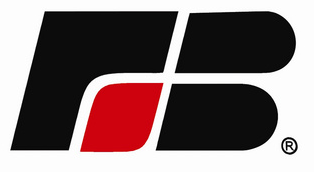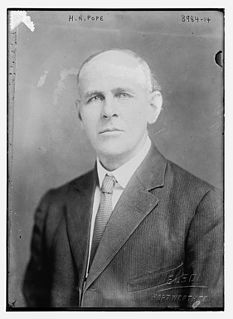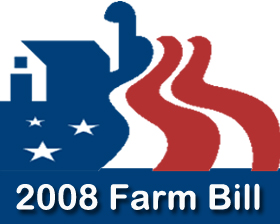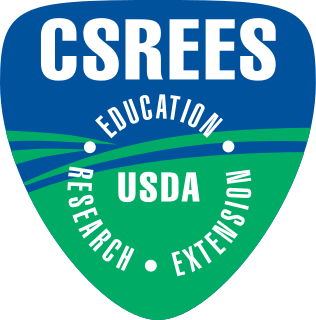
Community-supported agriculture is a system that connects the producer and consumers within the food system more closely by allowing the consumer to subscribe to the harvest of a certain farm or group of farms. It is an alternative socioeconomic model of agriculture and food distribution that allows the producer and consumer to share the risks of farming. The model is a subcategory of civic agriculture that has an overarching goal of strengthening a sense of community through local markets.

The American Farm Bureau Federation (AFBF), more commonly referred to as Farm Bureau (FB), is an independent, non-governmental, voluntary organization governed by and representing farm and ranch families united for the purpose of analyzing their problems and formulating action to achieve educational improvement, economic opportunity and social advancement and, thereby, to promote the national well-being. Farm Bureau is local, county, state, national and international in its scope and influence and is non-partisan, non-sectarian and non-secret in character. Farm Bureau is the voice of agricultural producers at all levels. AFBF is headquartered in Washington, D.C. There are 50 state affiliates and one in Puerto Rico.
The Commodity Credit Corporation (CCC) is a wholly owned United States government corporation that was created in 1933 to "stabilize, support, and protect farm income and prices". The CCC is authorized to buy, sell, lend, make payments, and engage in other activities for the purpose of increasing production, stabilizing prices, assuring adequate supplies, and facilitating the efficient marketing of agricultural commodities.

The Rainforest Alliance is a non-governmental organization (NGO) working to conserve biodiversity and ensure sustainable livelihoods by transforming land-use practices, business practices and consumer behavior. Based in New York City with offices throughout North and South America, Asia, Africa and Europe, it operates in more than 70 countries. It was founded in 1987 by Daniel Katz, who serves on its board of directors, and is currently led by CEO Han de Groot.

National Farmers Union is a national federation of state Farmers Union organizations in the United States. It is the second largest general farm organization in the country, after Farm Bureau. The organization was founded in 1902 in Point, Texas, and is now headquartered in Washington, D.C. Today, the organization continues its original mission: to protect and enhance the economic well-being and quality of life for family farmers and ranchers and their rural communities. It does this by promoting legislation and education beneficial to farmers, and by developing cooperative buying and selling methods and businesses. The current president is Roger Johnson, and the vice president is Donn Teske. Former NFU Presidents have included Tom Buis and David Frederickson
USDA Office of Rural Development (RD) is an agency with the United States Department of Agriculture which runs programs intended to improve the economy and quality of life in rural America.

In the United States, the farm bill is the primary agricultural and food policy tool of the federal government. The comprehensive omnibus bill is renewed every 5 years or so and deals with both agriculture and all other affairs under the purview of the United States Department of Agriculture.
A common perception is that the birth of Cooperative Extension followed passage of the Smith-Lever Act of 1914, which provided federal funds to land-grant universities to support Extension work. In a formal sense, this is true. Even so, the roots of Cooperative Extension extend as far back as the late 18th century, following the American Revolution, when affluent farmers first began organizing groups to sponsor educational meetings to disseminate useful farming information. In some cases, these lectures even were delivered by university professors — a practice that foreshadowed Cooperative Extension work more than a century later.

The Food, Conservation, and Energy Act of 2008 was a $288 billion, five-year agricultural policy bill that was passed into law by the United States Congress on June 18, 2008. The bill was a continuation of the 2002 Farm Bill. It continues the United States' long history of agricultural subsidies as well as pursuing areas such as energy, conservation, nutrition, and rural development. Some specific initiatives in the bill include increases in Food Stamp benefits, increased support for the production of cellulosic ethanol, and money for the research of pests, diseases and other agricultural problems.

Community wind projects are locally owned by farmers, investors, businesses, schools, utilities, or other public or private entities who utilize wind energy to support and reduce energy costs to the local community. The key feature is that local community members have a significant, direct financial stake in the project beyond land lease payments and tax revenue. Projects may be used for on-site power or to generate wholesale power for sale, usually on a commercial-scale greater than 100 kW.
Farm Credit of New Mexico is a FCS Agricultural Credit Association that provides New Mexico's farmers, ranchers, agricultural business, farm co-operatives and homeowners in rural communities with loans and banking services related to commercial and consumer needs. Headquartered in Albuquerque, it is the largest agricultural lender serving New Mexico. It is within both CoBank's and Farm Credit Bank of Texas's charter territories.

The Food, Agriculture, Conservation, and Trade (FACT) Act of 1990 — P.L. 101-624 was a 5-year omnibus farm bill that passed Congress and was signed into law.

The Farm Credit Act of 1971 recodified all previous acts governing the Farm Credit System (FCS), a cooperatively owned government-sponsored enterprise (GSE) that provides credit primarily to farmers and ranchers.

Marin Organic is a non-profit 501(c)(3) association of organic producers headquartered in Point Reyes Station, California. Founded in 1999 with the goal of creating the first all-organic county, Marin Organic staff and board work with government officials, community groups and organizations, fellow ranchers and farmers to advance the practice of sustainable, organic production. The organization has become an internationally recognized model for building economically viable, community-based local foodsheds.
The Green Mada’in Association for Agricultural Development (GMAAD) is a not-for-profit agricultural cooperative in Iraq. The cooperative's membership includes over 800 small farmers, mostly situated in Mada’in Qada, a region east of Baghdad in Baghdad Governorate.
A loan waiver is the waiving of the real or potential liability of the person or party who has taken out a loan through the voluntary action of the person or party who has made the loan. Examples of loan waivers include the Stafford Loan Forgiveness program in the United States and the Agricultural Debt Waiver and Debt Relief Scheme in India.

University of Alaska Fairbanks Cooperative Extension Service is an outreach-based educational delivery system supported by a partnership between the United States Department of Agriculture (USDA) and the University of Alaska Fairbanks (UAF). The UAF Cooperative Extension Service annually serves approximately 80,000 Alaskans, “providing a link between Alaska's diverse people and communities by interpreting and extending relevant university, research-based knowledge in an understandable and usable form to the public.” Since 1930 the UAF Extension Service has partnered with many organizations across the state of Alaska in pursuit of fulfilling its land-grant university mission to disseminate agricultural research and other scientific information.

The Cooperative State Research, Education, and Extension Service (CSREES) is an extension agency within the U.S. Department of Agriculture (USDA), part of the executive branch of the federal government. The 1994 Department Reorganization Act, passed by Congress, created CSREES by combining the former Cooperative State Research Service and the Extension Service into a single agency.











